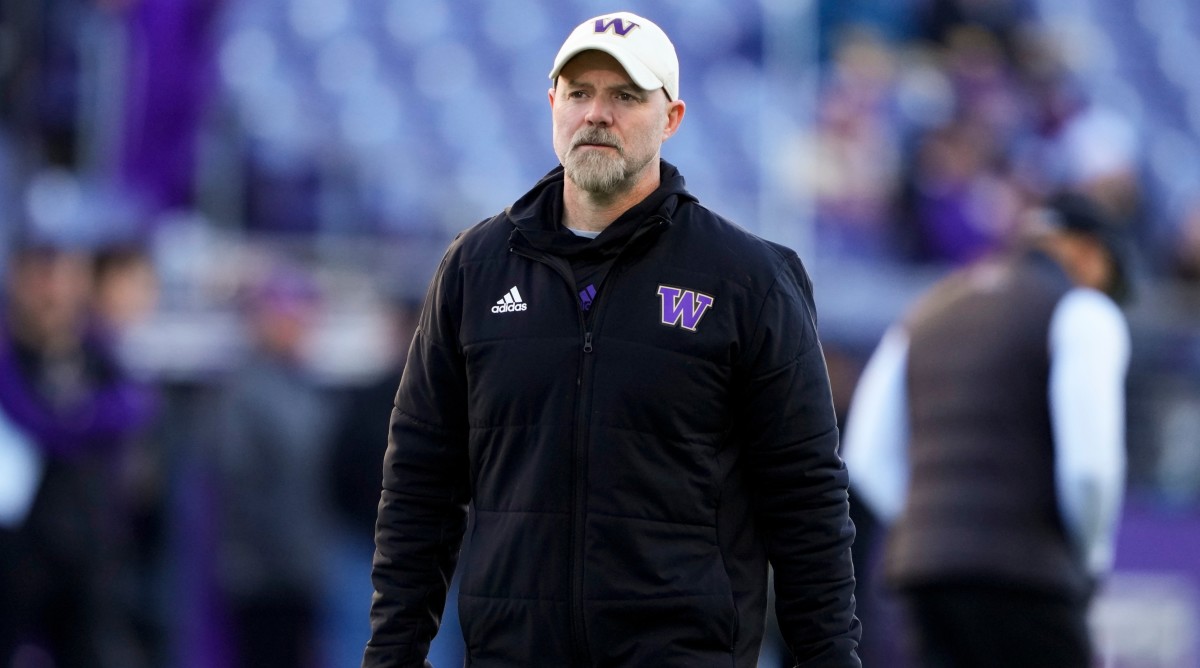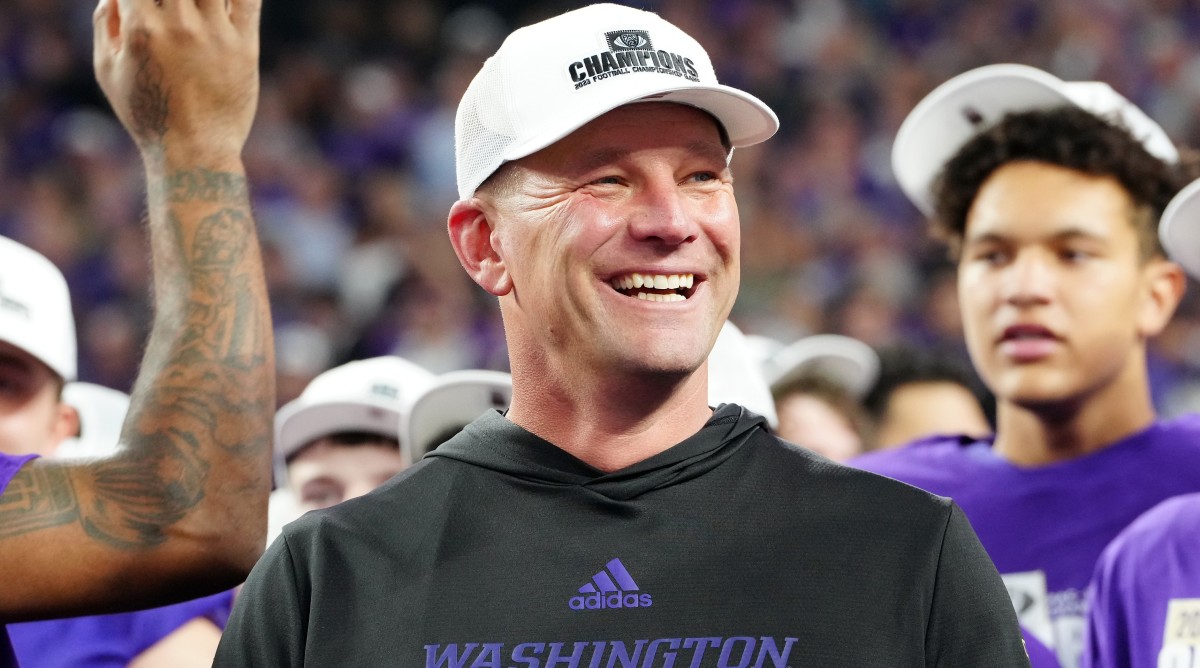The Rapid Rise of Washington Football’s Brain Trust, From Sioux Falls to the CFP

The first rule of travel in the Great Plains Athletic Conference is that it’s all by bus. Forget charter planes at the NAIA level of college football; there are no planes at all unless the playoffs mandate it. Teams see a lot of Interstates 29 and 80 through South Dakota, Nebraska and Iowa in the GPAC.
Ryan Grubb’s first bus ride as an assistant coach at the University of Sioux Falls, back in 2007, wound up in a park in Nebraska. “We stopped for the pregame meal, which was at a park, and we pulled the coolers out of the bus and had sandwiches before the game,” Grubb recalled. “So I was like, ‘Wow, this is intense.’”
Grubb relayed that story sitting at a New Orleans hotel dais Thursday as the offensive coordinator at Washington, which is preparing to play Texas in the Sugar Bowl semifinal of the College Football Playoff. He’s just a decade removed from the NAIA level, the place where he first linked arms with head coach Kalen DeBoer to form what should be acknowledged as the best offensive brain trust in college football, having led the nation in passing yards per game both last season and this season.

The story of their rise from utter obscurity to the top of the sport should fill the strivers who coach at the lowest levels of college ball with hope. You can get here from there, one bumpy bus ride at a time. Not every sharp football mind is found on a power-conference campus. Not every successful coaching career has to go through Tuscaloosa or Athens or Columbus if you know what you’re doing—and if you can convince those doing the hiring that you know what you’re doing.
That’s not to say the Kirby Smart path—working only at big-time programs or the NFL for the past 20 years—doesn’t work. It’s to say that there are more paths to the top than just progressing through a blueblood pipeline.
Look at what Lance Leipold is doing at Kansas, winning nine games this year at a school that had lost a minimum of nine games every season from 2010 to ‘21. Leipold went 109–6 at the NCAA Division III level, winning six national championships, but didn’t get a power-conference job for another seven years after the last of those titles in ‘14.
Look at Chris Klieman at Kansas State, who arrived from FCS North Dakota State in 2019 and won the Big 12 in ‘22. Look at David Braun, the former NDSU assistant who won eight games as the emergency interim coach at Northwestern, a feat that earned him both Big Ten Coach of the Year honors and the full-time job.
For DeBoer, Grubb and Washington defensive coordinator Chuck Morrell, what worked building NAIA playoff teams at Sioux Falls translates to building an NCAA Division I playoff team at Washington.
“We’re mentors and teachers first,” Grubb said. “And I think that the better you can be at filling in gaps and doing the best with the resources that you have, regardless of where you’re at … if you’re at the New York Jets or Washington or University of Sioux Falls, it doesn’t matter.
“I think you always want to make the most of what you have … and make everything about the players and the people. And I think that that translates, no matter where you’re at.”
What has translated at every stop for DeBoer is outrageous winning.
He was 67–3 as the head coach at Sioux Falls, winning three NAIA national championships in five seasons. That’s incredible, but consider this: DeBoer won 56 of his final 57 at the school, with the only loss coming in a title game against Carroll College that was played in a downpour that produced nine combined fumbles. He was offensive coordinator for Indiana’s only eight-win season in the last 30 years, in 2019. He was 9–3 in his only full season as head coach at Fresno State.
And now the 49-year-old DeBoer is on a 20-game winning streak as coach at Washington. He’s won 24 out of 26 with the Huskies, which could be the best two-year run in school history, depending how this season ends.

The fact that he’s done it with two coordinators who have been around since the bus days of NAIA is striking. The bond between them is strong enough that Grubb turned down the Alabama offensive coordinator job this past offseason, opting for the guys he knew and felt comfortable with.
“I think when you’re looking at wherever you’re working, you want to be somewhere where, number one, you feel like you can make an impact,” Grubb said. “Where you can be yourself. And those were things that were important to me. My style of offense and the things I wanted to accomplish, I didn’t want a bunch of restrictions on that. And I wanted to be able to be more collaborative with the people I was going to be with and have more control of the situation. I feel like I do have a lot of input with what happens with the program.”
At no point was Grubb’s input more critical than on a fourth-and-1 in the fourth quarter from Washington’s own 29-yard line in the regular-season finale against Washington State. The Huskies were surprisingly locked in a tie game with the rival Cougars with 1:14 left to play. Conventional wisdom screamed that they should punt and play defense and try to win in overtime.
But Grubb told DeBoer that he wanted to go for it. DeBoer asked if Grubb was sure. DeBoer even called a timeout to make extra sure that Grubb was sure. Fail to get the first down, and Wazzu was immediately within field-goal range to ruin Washington’s perfect record and boot the Huskies from playoff contention.
But DeBoer trusted his Sioux Falls, ride-or-die OC with the biggest call of the season—and it wasn’t just some stereotypical power run into the line. It was a fake of a handoff, with quarterback Michael Penix Jr. then flipping the ball backward to wide receiver Rome Odunze on a jet sweep.
The entirety of the Washington State defense went for either option one (a handoff to running back Dillon Johnson) or option two (Penix pulling the ball and keeping it). Odunze flashed around left end for a jaw-dropping 23 yards on the nerviest play call of 2023, and the Huskies kicked the winning field goal a few plays later as time expired.
Credit DeBoer and Grubb for being sufficiently in the moment to simply dial up a play to get a first down, without thinking of the consequences of failure. If it had gone wrong and the Huskies had lost, that probably would have been the most criticized play call in Washington football history.
But there is something to be said for the elusive art of drawing up ball plays that will work if executed properly on any level. From the bus leagues of NAIA to the pressure points of the College Football Playoff race, football is football. Washington’s coaching staff knows how to win on stages great and small.
